2003
2003 CTAUN Conference
Friday, January 31, 2003
Literacy Now: Building An Educated World
Overview
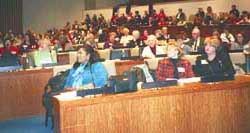 Nearly 500 educators assembled in Conference Room 4, United Nations Headquarters on Friday, 31 January 2003 for CTAUN’s fifth annual conference. They represented schools, educational groups and communities in eight countries including twenty-one US states plus the District of Columbia and levels of education from pre-school to the university.
Nearly 500 educators assembled in Conference Room 4, United Nations Headquarters on Friday, 31 January 2003 for CTAUN’s fifth annual conference. They represented schools, educational groups and communities in eight countries including twenty-one US states plus the District of Columbia and levels of education from pre-school to the university.
Anne-Marie Carlson
Conference Chair
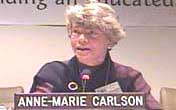 Anne-Marie Carlson welcomed the participants to CTAUN’s 2003 conference inviting all to listen to the two pre-conference UN speakers — 1) Bill Yotive, Project Manager, United Nations Global Teaching and Learning Project focusing on the UN’s Cyberschoolbus — http://www.cyberschoolbus.un.org and 2) Ramu Damodaran, Officer-in-Charge, Civil Society Service Outreach Division, UN Department of Public Information (UN/DPI) focusing on the “UN Chronicle” — http://www.un.org/Pubs/chronicle/index.html. In their presentations, participants were introduced to both sites and recent developments and were encouraged to use both in their educational settings and to consider contributing ideas.
Anne-Marie Carlson welcomed the participants to CTAUN’s 2003 conference inviting all to listen to the two pre-conference UN speakers — 1) Bill Yotive, Project Manager, United Nations Global Teaching and Learning Project focusing on the UN’s Cyberschoolbus — http://www.cyberschoolbus.un.org and 2) Ramu Damodaran, Officer-in-Charge, Civil Society Service Outreach Division, UN Department of Public Information (UN/DPI) focusing on the “UN Chronicle” — http://www.un.org/Pubs/chronicle/index.html. In their presentations, participants were introduced to both sites and recent developments and were encouraged to use both in their educational settings and to consider contributing ideas.
Opening Address
Dr. Thoraya Obaid
Executive Director, United Nations Population Fund (UNFPA) http://www.unfpa.org
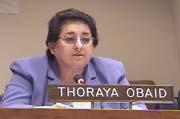 Dr. Obaid congratulated CTAUN for taking up the theme of Universal Literacy and said that in a very real sense, teachers were ambassadors on behalf of the UN. She told how she was the daughter of devout Moslem parents who took literally the first injunction of the Qu’ran, “Read.” So at seven, her father sent her away from her home in Saudi Arabia to a Presbyterian School in Egypt. Her parents did not mind her going from an Islamic Madrassa to a Christian Missionary School because they had made education the highest priority in her early life.
Dr. Obaid congratulated CTAUN for taking up the theme of Universal Literacy and said that in a very real sense, teachers were ambassadors on behalf of the UN. She told how she was the daughter of devout Moslem parents who took literally the first injunction of the Qu’ran, “Read.” So at seven, her father sent her away from her home in Saudi Arabia to a Presbyterian School in Egypt. Her parents did not mind her going from an Islamic Madrassa to a Christian Missionary School because they had made education the highest priority in her early life.
There are more than 800 million illiterate people in the world today. If you were to imagine there were only 100 people in the world, 15 of them would be illiterate and more than half of those would be women and girls. She said education is a source of light and hope. It helps people to understand the human condition and the diversity of cultures and civilizations. It is a great equalizer and a powerful tool of improving health and social well-being. It is the building block of democratic open societies.
As part of the UN’s Millennium goals, world leaders had set the target of universal literacy by 2015, and by 2005 equal enrollment of boys and girls in primary schools. In developing countries, poverty and AIDS made it especially hard for children, especially girls, who so often suffered discrimination, to complete their education. UNFPA, which now operates in over 140 countries, is encouraging the teaching of Life Skills, which gives priority to teaching about sexual and reproductive health so as to prevent unwanted pregnancies and the spread of AIDS. Everywhere Dr. Obaid has traveled, she finds that people yearn for the values enshrined in the Universal Declaration of Human Rights — education and health care, peace, justice, opportunity and equality. She said that we should all work together to promote these human rights and the universal values that unite us as one human family sharing one common globe.
Morning Panel
“Literacy Issues We Face”
 Collectively, the panel addressed the ways in which gender, family, teacher training, educational assessment, cultural relevance and access to education impacts literacy achievement, cross-culturally.
Collectively, the panel addressed the ways in which gender, family, teacher training, educational assessment, cultural relevance and access to education impacts literacy achievement, cross-culturally.
Dr. Lesley Mandel Morrow
President-elect, International Reading Association – http://www.reading.org, and Professor, Graduate School of Education, Rutgers University – http://www.gse.rutgers.edu
 Dr. Morrow began by asking spectators to reference the “Confusabet,” multiple lines of gibberish found on the handout, to experience the frustration and discomfort illiterate people experience everyday as they work and live in a literate world. To effectively teach children to read, write and think critically, particularly those who inhabit marginalized populations, wide-spread incorporation of three elements are imperative: 1) policy support, 2) professional development and teacher preparation and 3) partnership with family members.
Dr. Morrow began by asking spectators to reference the “Confusabet,” multiple lines of gibberish found on the handout, to experience the frustration and discomfort illiterate people experience everyday as they work and live in a literate world. To effectively teach children to read, write and think critically, particularly those who inhabit marginalized populations, wide-spread incorporation of three elements are imperative: 1) policy support, 2) professional development and teacher preparation and 3) partnership with family members.
Recent policy implementations, such as “No Child Left Behind Legislation: Reading First,” has contributed directly to increased availability of grant money for teacher training and classroom development, and inspired a host of research projects dedicated to determining the five elements imperative to literacy achievement: more time on task, classroom structure and routine, background knowledge, practice, and teacher feedback.
Building upon these critical elements, recent studies show that one of the most important factors for literacy success is the presence of an exemplary teacher, someone who among other things incorporates different strategies of learning into the classroom day, recognizes and addresses individual differences, is a superior manager and organizer, demonstrates excellent affective qualities, engages in regular professional development, and has high expectations for students. The importance of teacher-training and professional development cannot be over-emphasized.
A child’s family environment, too, plays a significant role in critical literacy development, studies show. Children must not only have persistent parents that understand the importance of education, but they must have access to school, a sufficient food supply, proper after-school supervision, and family-provided incentives for learning. Children with a strong family unit score higher across the board on standardized literacy exams.
Dr. Jones Kyazze
Director, UNESCO NY Liaison Office to the United Nations – http://www.unesco.org
 Dr. Kyazze described the special responsibility of UNESCO for putting the UN’s Literacy Decade into effect. It will be launched at the UN in two weeks time and is a specific plan of action to unite the efforts already made by UN agencies and others to follow through on the proposals of the 1990 education conference held in Jomtien, Thailand. More effort at coordination is needed because ten years later, at another conference in Dakar, Senegal, the problems of poverty, lack of health and education, human rights and democracy were no closer to being solved. The need for literacy to enable people to understand these problems and empower them to join in overcoming them led to the declaration of the UN’s Literary Decade.
Dr. Kyazze described the special responsibility of UNESCO for putting the UN’s Literacy Decade into effect. It will be launched at the UN in two weeks time and is a specific plan of action to unite the efforts already made by UN agencies and others to follow through on the proposals of the 1990 education conference held in Jomtien, Thailand. More effort at coordination is needed because ten years later, at another conference in Dakar, Senegal, the problems of poverty, lack of health and education, human rights and democracy were no closer to being solved. The need for literacy to enable people to understand these problems and empower them to join in overcoming them led to the declaration of the UN’s Literary Decade.
How will this effort be different from previous ones? UNESCO is taking a lead role in coordination, research and statistics to track the progress of countries. The effort will be more inclusive, integrating projects with schools, youth education, adult education, minority languages and indigenous populations. It will deal with real life situations such as gender equality, health, and democracy, to make literacy more relevant. The goal is to reduce illiteracy in stages during the decade, and through periodic reports monitor the progress and success of what is being done.
Dr. Elaine Furniss
Senior Advisor, Education, Programme Division, UNICEF
http://www.unicef.org/teachers
 Dr. Furniss pointed out that in equal partnership with UNESCO, the World Bank, UNDP, UNFPA, and scores of bilateral agencies and civil society organizations, UNICEF has committed itself to a new campaign, “Education For All” (EFA), to ensure that by 2015, all children — particularly girls, children in difficult circumstances and those belonging to ethnic minorities — have access to and can complete a quality primary education that is free and compulsory.
Dr. Furniss pointed out that in equal partnership with UNESCO, the World Bank, UNDP, UNFPA, and scores of bilateral agencies and civil society organizations, UNICEF has committed itself to a new campaign, “Education For All” (EFA), to ensure that by 2015, all children — particularly girls, children in difficult circumstances and those belonging to ethnic minorities — have access to and can complete a quality primary education that is free and compulsory.
Unfortunately, most literacy efforts internationally are text-based, concentrating on the three Rs – reading, writing and arithmetic. Not as prominently taught, but an equally important element of ‘literacy,’ is the ability to apply a critical perspective to the subject at hand. Furthermore, with the advance of technology, new forms of literacy tools emerge each year. As these new ‘literacies’ develop, so too should the ‘literacies’ we teach. Unfortunately, it is the most marginalized populations that have the least access to emerging technologies, contributing to an increasing gap between the political power that the ‘haves’ and the ‘have nots’ have over their quality of life.
To correct this, or at least to slow its development, it is imperative that three things occur: 1) intellectual engagement and the development of critical thinking skills need to be prioritized in the classroom; 2) the concept of ‘literacy’ must expand to incorporate the newest forms of communication and production. Similarly, these ‘new literacies’ must be taught to all populations, not just to the most advantaged; and 3) to encourage engagement and comprehension, literacy efforts must include materials rooted in the indigenous language, culture, and values of the learning population, and not in that of the population they serve.
Thoughts on Literacy
Mrs. Nane Annan
Author, lawyer, artist, child advocate and wife of United Nations Secretary-General Kofi Annan
 Mrs. Annan expressed her pleasure at being with teachers, and her admiration of what they are doing to open children’s eyes to the wonders of the world. Her own experience with her grandchild has shown her how satisfying it is to take part in the development of children. Teachers provide a compassionate environment for teaching children creativity and independence and she thanked them for being at this conference and supporting the work of the UN.
Mrs. Annan expressed her pleasure at being with teachers, and her admiration of what they are doing to open children’s eyes to the wonders of the world. Her own experience with her grandchild has shown her how satisfying it is to take part in the development of children. Teachers provide a compassionate environment for teaching children creativity and independence and she thanked them for being at this conference and supporting the work of the UN.
On her travels with her husband, Mrs. Annan has seen aspects of the program of the UN’s Literacy Decade in providing education of quality, gender relevance and human development which enhanced people’s capacities to cope with their problems and get beyond their limitations. In her travels in Africa, she found AIDS to be the most desperate problem. Forty-two million people are infected, leaving 4 million orphans, many living on the streets. What hope is there for the education of young people when teachers are dying, students are needed at home to take care of the sick, and malnutrition and violence are rampant? AIDS is preventable when people learn more about its causes.
Apathy is lethal. Hope lies in education. Mrs. Annan encouraged all to look at the website http://www.apathyislethal.org.
Afternoon Panel
Child Friendly School Projects of UNICEF
Meg Gardinier
Director, Non-Governmental Organizations, US Fund for UNICEF — http://www.unicefusa.org
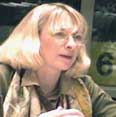 Mrs. Gardinier pointed out that the UN Convention on the Rights of the Child (1989) declares education to be one of those rights. Although 185 governments support this convention, education for all can only become a reality through a partnership of public and private initiatives. The report, “We the Children,” came out of the special UN Session on Children in 2002, and although it showed progress among urban and elite groups, there are still 120 million children not in school, the majority of whom are girls. Children’s participation in understanding the need for education and in taking action to enable other children to learn empowers children everywhere. Successful programs also require good relationships with parents and teachers. The problems of violence, discrimination, unemployment and lack of information on sex and drugs can only be solved if governments take action together with civil society.
Mrs. Gardinier pointed out that the UN Convention on the Rights of the Child (1989) declares education to be one of those rights. Although 185 governments support this convention, education for all can only become a reality through a partnership of public and private initiatives. The report, “We the Children,” came out of the special UN Session on Children in 2002, and although it showed progress among urban and elite groups, there are still 120 million children not in school, the majority of whom are girls. Children’s participation in understanding the need for education and in taking action to enable other children to learn empowers children everywhere. Successful programs also require good relationships with parents and teachers. The problems of violence, discrimination, unemployment and lack of information on sex and drugs can only be solved if governments take action together with civil society.
UNICEF/USA has undertaken several projects. In the state of Chiapas in Mexico, 91% of the indigenous population live below the poverty line and have an illiteracy rate four times higher than the rest of the country. Schools have been set up incorporating important principles, such as a friendly environment supportive to girls, respect for mother tongues, and empowerment for teachers with work plans for improvement. In Afghanistan the need was to set up schools, especially for girls, to vaccinate children, provide tents, supplies and training in the use of materials. The work needs to continue, and requires help from all sources.
Women’s Voices for Literacy
Nancy Eynon Lark
Director, American Association of University Women (AAUW) Educational Foundation — http://www.aauw.org
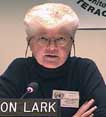 Ms. Lark described how the American Association of University Women is providing funds for fellowships for teachers and community action projects on issues of women¹s education. As a result of the conference on women in Beijing, AAUW undertook research on keeping Chinese girls in school. In 2002 there was an International Symposium on women¹s education and change, and an examination of literacy strategies that are working. The community and family need to be involved to ensure that literacy is appropriate to the local culture. Literacy and economic development are linked. There is a multiplying effect of educating women and utilizing their wisdom in decision making. AAUW has projects answering women’s hunger for knowledge and empowering them to act.
Ms. Lark described how the American Association of University Women is providing funds for fellowships for teachers and community action projects on issues of women¹s education. As a result of the conference on women in Beijing, AAUW undertook research on keeping Chinese girls in school. In 2002 there was an International Symposium on women¹s education and change, and an examination of literacy strategies that are working. The community and family need to be involved to ensure that literacy is appropriate to the local culture. Literacy and economic development are linked. There is a multiplying effect of educating women and utilizing their wisdom in decision making. AAUW has projects answering women’s hunger for knowledge and empowering them to act.
Books to Dreams
Miriam Epstein
Director, Books to Dreams —bookstodreams@yahoo.com
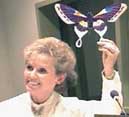 Mrs. Epstein stressed the importance of reading for children, not only to develop their literacy skills but also for their imagination, memory and self-confidence. Many children do not have access to good books, or the opportunity to own a book of their own. “Books to Dreams” has been able to give nearly 150,000 books to children in need, providing nearly 500 literacy programs in homeless shelters where all children have their own book to read. Now, hundreds of generous people, businesses, legislators, publishers, schools, houses of worship and organizations contribute books, along with hours and funding and the work continues. Monica Mills, a student who had started reading as a result of this program, is now on the honor team in her school, studying to be a civil engineer. She felt she was an example of the effects of solving problems locally by people developing programs like “Books to Dreams.”
Mrs. Epstein stressed the importance of reading for children, not only to develop their literacy skills but also for their imagination, memory and self-confidence. Many children do not have access to good books, or the opportunity to own a book of their own. “Books to Dreams” has been able to give nearly 150,000 books to children in need, providing nearly 500 literacy programs in homeless shelters where all children have their own book to read. Now, hundreds of generous people, businesses, legislators, publishers, schools, houses of worship and organizations contribute books, along with hours and funding and the work continues. Monica Mills, a student who had started reading as a result of this program, is now on the honor team in her school, studying to be a civil engineer. She felt she was an example of the effects of solving problems locally by people developing programs like “Books to Dreams.”
Global Peace Schools Programme
Michelle Morris
NGO Civil Society and Youth Liaison Officer, Office of the Secretary-General for Children and Armed Conflict —http://www.un.org/children/conflict
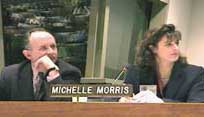 Ms. Morris representing the office of Under-Secretary-General Olara Otunnu, spoke of the dire needs of the more than 20 million children displaced over time by wars and conflicts. One million are orphans, six million are injured or disabled and ten million suffer psychological trauma. 300,000 children serve as soldiers every day, and 8,000 are the first killed by landmines as they are smaller than adults and closer to the ground. Her advocacy office has programs to raise awareness of the problem and to educate people on the need for action.
Ms. Morris representing the office of Under-Secretary-General Olara Otunnu, spoke of the dire needs of the more than 20 million children displaced over time by wars and conflicts. One million are orphans, six million are injured or disabled and ten million suffer psychological trauma. 300,000 children serve as soldiers every day, and 8,000 are the first killed by landmines as they are smaller than adults and closer to the ground. Her advocacy office has programs to raise awareness of the problem and to educate people on the need for action.
Jerry Piasecki
Author, Global Peace Schools books
Mr. Piasecki has written books to educate, motivate and activate people in this area. His books illustrate the agony of children and families caught in combat, and how their reality can change in a flash. These books are examples of how literacy lessons can successfully double as advocacy tools, inspiring young people to improve conditions in their own community and abroad. The first in this series is Marie In the Shadow of the Lion and was published by the UN in 2001 and the second book will be out soon. Teachers should be on the lookout for details as to how schools can be designated as “peace schools” and students as “peace ambassadors.”
Student Presenters and Teachers
Marcia McBroom
Small, teacher, Manhattan Comprehensive Night and Day High School, New York, NY — http://www.mancomp.org
 This unique high school is open 11 a.m. to 11 p.m. for older students 17 to 21 with adult responsibilities. Mrs. Small’s program gets students to write their stories and their feelings, their history. She reported getting so much love and enrichment from her work and applies the concept within her family. Even her son at the age of 5 could write down memories of what had been learned since he was 4, “writing a resume” of skills learned during that year as a way of building self-esteem. Through their writing, each student can reach out to others as well. Booklets produced in her program were part of the Literacy Information Fair display and were handed out to Conference participants who completed and turned in their evaluation forms.
This unique high school is open 11 a.m. to 11 p.m. for older students 17 to 21 with adult responsibilities. Mrs. Small’s program gets students to write their stories and their feelings, their history. She reported getting so much love and enrichment from her work and applies the concept within her family. Even her son at the age of 5 could write down memories of what had been learned since he was 4, “writing a resume” of skills learned during that year as a way of building self-esteem. Through their writing, each student can reach out to others as well. Booklets produced in her program were part of the Literacy Information Fair display and were handed out to Conference participants who completed and turned in their evaluation forms.
Four students from the school spoke:
Nurtai Hassan
Mr. Hassan was a member of the Uyghur minority in western China near Tibet, one of 56 ethnic groups in China. He came to the US in 2001. His story described the segregation of the ethnic groups from Chinese students within schools in China, and the hardship of the physical work required of students from the ethnic groups at school. In one anecdote, he spoke of his English teacher who taught up to Chapter 15 in the English book and then left, to be replaced by a new English teacher who started all over to get only as far as Chapter 15 before leaving. When a new English teacher came, she swore to teach English beyond Chapter 15 but never made it. Nurtai wants to major in economics in college and return to his area of China and become a teacher.
Dikra Algutani
Ms. Algutani is part of a Muslim Yemeni family numbering 20 members who came to the US in 1999. She wants to be a lawyer and is currently studying at La Guardia College. She spoke of the difficulties of studying 13 subjects in her old school in Yemen, where no two subjects could be failed. She spoke of a 31% gender gap in education in Yemen with many women students dropping out of high school.
Sarita and Anupam Udyavar
A brother and sister team of presenters from Bombay in India. They came to the US in April 2002. They spoke of four imperatives in India: food, clothing, shelter and education. They emphasized that the first priority for women is education, and that the literacy of young women is paramount. If a man is taught literacy, he may learn to read; if a woman becomes literate, her whole family will benefit.
Literacy in Africa: Tremendous Challenges, Tremendous Opportunities, and Implications for Us All
Margaret Nkrumah, Principal, SOS Hermann Gmeiner International College, Tema, Ghana — http://www.louest.com/g-ic.htm
Margaret Nkrumah
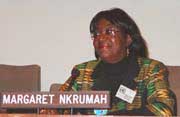 Mrs. Nkrumah spoke movingly about the need to recognize Africans’ thirst for education, and the buoyancy of its people which gives hope for unleashing the human resources of the continent. Though literacy is the basis of education, the process of achieving that literacy is far more complicated in developing countries than in schools in developed ones. Poverty is the greatest obstacle, caused by the original exploitation of colonialism, unfair trade practices leading to crushing debt, and corruption. There are not enough schools or teachers, and even though 80% of school age children enter first grade in Ghana, the drop out rate increases exponentially so that only 20% of the original number enter high school. Most of those leaving school early are girls, and as a result, 70% of women in sub-Sahara Africa are illiterate. The armed conflicts bedeviling parts of Africa make schooling impossible in those areas. These factors reinforce the problem of the unemployment of Africans, and their hopelessness at their unemployability.
Mrs. Nkrumah spoke movingly about the need to recognize Africans’ thirst for education, and the buoyancy of its people which gives hope for unleashing the human resources of the continent. Though literacy is the basis of education, the process of achieving that literacy is far more complicated in developing countries than in schools in developed ones. Poverty is the greatest obstacle, caused by the original exploitation of colonialism, unfair trade practices leading to crushing debt, and corruption. There are not enough schools or teachers, and even though 80% of school age children enter first grade in Ghana, the drop out rate increases exponentially so that only 20% of the original number enter high school. Most of those leaving school early are girls, and as a result, 70% of women in sub-Sahara Africa are illiterate. The armed conflicts bedeviling parts of Africa make schooling impossible in those areas. These factors reinforce the problem of the unemployment of Africans, and their hopelessness at their unemployability.
And yet given the opportunity, Africans can succeed as well as other students. SOS Kinderdorf International (SOS Children’s Villages) <http://www.sos-childrensvillages.org> with grants from governments and other sources, has pioneered good education, creating schools all over the world for abandoned and disadvantaged children in crisis. First comes the physical needs of building schools, providing desks, chairs, clothing, transportation, books, and not forgetting sanitary basics like VOTs ventilated outdoor toilets.
Then comes the nature of the education, which must be culturally relevant to the area served by the schools. The schools established by SOS Children’s Villages pioneered a holistic approach to poverty, recognizing that literacy is more than reading and writing. Young people need training for jobs and the possibility of using their skills and knowledge in the service of their societies. The SOS Hermann Gmeiner International School (SOS HGIC) in Tema, Ghana, prepares students for higher education and many go on to attend the best universities around the world. Universities in the USA and Canada provide generous scholarships, supplemented by grants from SOS and SOS Children’s Villages. These graduates prove that there are no heights African children cannot reach, given the opportunities.
The high school curriculum offered by the Hermann Gmeiner schools in Africa is also important in educating young people to the highest level of literacy and to a sense of social responsibility. The International Baccalaureate Organization contributes academic courses leading to university entrance, as well as activities dedicated to community service. The education is both international and appropriate for the African context, especially by enabling an increasing number of girls to participate in the learning of all subjects, including math and the sciences.
The right of education for all is unfortunately honored more in the breach than its observance. However, many people have been helping to educate young people in Africa and throughout developing countries to improve their lives and their communities.
CTAUN’s 2002 Best Practices Award
The recipients of CTAUN’s 2002 Best Practices Award were St. Mary School of Putnam, Connecticut and The River School of Nyack, New York.
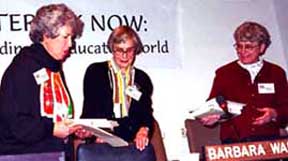
This award goes to schools which have put into practice discoveries and materials from the previous year’s conference. With CTAUN’s 2002 conference focusing on the environment, both schools received certificates and autographed copies of Nane Annan’s new book,Tip & Top — The Adventures of Two Water Drops!, and Robert F. Kennedy, Jr.’s The Riverkeepers.
Literacy Information Fair
CTAUN’s Literacy Information Fair held from 12:15—1:30 p.m. in the UN Exhibit Area included exhibits from twenty-five literacy based organizations. Literacy-related resources, projects, posters, programs, games, writings, and other materials were exhibited by these groups. A complete list of organizations participating and their links follows.
- American Association of University Women / International Federation of University Women / Virginia Gildersleeve International Fund — Carolyn Donovan
Information on women¹s literacy projects worldwide with display of literacy resources. (http://www.aauw.org / http://www.ifuw.org /http://www.vgif.org) - American Library Association Office for Literacy and Outreach Services and Westchester Literacy and Learning Alliance (New York) — Robin Osborne
Resources on literacy from the ALA and from a local New York literacy program. (http://www.ala.org/olos) - American Model United Nations International — Brian Endless
Information on the UN and on Model UN-ing, including complimentary CDs. (http://www.amun.org) - ATD Fourth World — Lisa Steinbrueck
Newsletters by Tapori, an international network of children who fight poverty. (http://www.atd.quartmonde.org) - Books to Dreams — Miriam Epstein
Conference presenter¹s literacy program for children and parents in homeless shelters and children in need. - Delta Kappa Gamma Epsilon State Literacy Committee(Louisiana) — Naomi Coyle
Project Crony literacy project by the Louisiana chapter of Delta Kappa Gamma, the international honor society for women educators. - For Our Children’s Sake, Inc. and Manhattan Comprehensive Night and Day High School — Marcia L. McBroom Small and Students
Conference presenters’ materials about a New York City grassroots organization and writing projects done by youth in the program. Includes book displays and ordering information. - Friendship Through Education — Diane Midness
Information on programs facilitating interactions between youth worldwide and possibilities for teacher involvement. (http://www.friendshipthrougheducation.org) - Fulbright Association Greater New York — Martin Haber
Information on literacy programs of the Fulbright Association. (http://www.fulbright.org) - Get Caught Reading — Kathryn Blough
Posters and descriptions of programs that promote and celebrate reading. Sponsored by Association of American Publishers and Magazine Publishers of America. (http://www.getcaughtreading.com) - Global Education Motivators (GEM) — Wayne Jacoby
Information on teaching about the UN via videoconferencing for staff development and classroom interactions, including CDs on UN resources for teachers. (http://www.gem-ngo.org) - Hague Appeal for Peace — Meg P. Gardinier
Displays peace education materials from the Global Campaign for Peace Education. (http://www.haguepeace.org) - International Education & Resource Network ( iEARN ) — Lisa Jobson
Information on the international schools network program, online professional development workshops, 2003 conference in Japan and examples of past project work. (http://www.iearn.org) - Literacy Partners — Susan McLean
Materials on the New York-based family literacy program and the national What Works Literacy Partnership program. (http://www.literacypartners.org) - NetAid Foundation — Abby Falik
Presents “NetAid World Class,” the educational role-play game for children aged 8-12. (http://www.netaid.org) - The Ocean School (New York) — Eileen Venezia
Excerpts from booklets comprised of writings from school children in a community affected by 9/11. - Peace Corps World Wise Schools/ Peace Corps New York Office — Donna Molinari/James Carmody
Presents information about Peace Corps literacy and worldwide schools programs. (http://www.peacecorps.gov/wws) - Putumayo Cross Cultural Initiative — Faye Feller
Information on the programs that use music to foster global citizenship and improve literacy. Displays World Playground Multicultural Activity Kit and more. (http://www.putumayo.org) - Rotary International — Sylvan Barnet
Displays information on Rotary literacy programs worldwide. (http://www.rotary.org) - Susquehanna County (Pennsylvania) Family Literacy — Cindy Reynolds
Storyboard on a local family literacy program; shows tools used for assessment, equipment families use to play and learn, projects parents and children have done. - U.S. Fund for UNICEF — Katie McKenna
Displays current information on UNICEF programs for children worldwide. (http://www.unicefusa.org)
UN Agency Exhibitors
United Nations Children’s Fund (UNICEF) — Andres Guerrero
Literacy program materials from the UN agency focused on children. (http://www.unicef.org)
- United Nations Department of Public Information (UNDPI) — Vivian Bernstein
Materials from the resource center and video library maintained for non-governmental organization (NGO) representatives and others. (http://www.un.org/dpi/ngosection) - United Nations Educational, Scientific and Cultural Organization(UNESCO) — Susan Byng-Clarke
Presents information on educational and literacy programming by the lead UN agency for the United Nations Literacy Decade (2003-2012). (http://www.unesco.org) - United Nations Office of Special Representative of Secretary General for Children and Armed
Conflict — Michelle Morris
Exhibits materials on the Global Peace Schools Program and offers opportunity to participate in the program. (http://www.un.org/children/conflict)
Photos from the conference
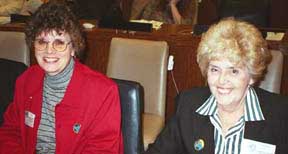
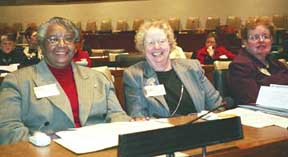
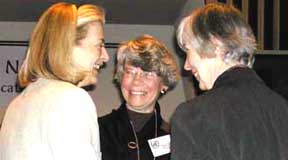
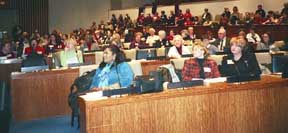
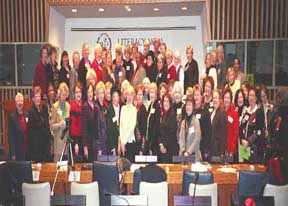
Literacy Resources on the Web
Networks and Directories
Adult Literacy & Technology Network(http://www.altn.org)
National U.S. organization dedicated to developing technology solutions for enhancing adult literacy. Maintains the LINCS gateway to multimedia literacy curricula, special collections, experts. Links to peer-reviewed Adult Basic Education and literacy sites in the U.S. and internationally.
America’s Literacy Directory(http://www.literacydirectory.org)
Service of the National Institute for Literacy for finding literacy, GED and ESL programs and resources by location and type; U.S. States hotlines, contacts included. Provides glossary and links to other resource organizations. Nearly 5000 U.S. literacy programs can be searched through the website, new programs shared.
International Literacy Network (http://www.theiln.org)
Membership includes a range of United Nations, U.S. Government, non-profit and educational organizations and for-profit companies involved in the campaign for literacy; links to each member’s website and “success stories” included. Promotes International Literacy Day and other events.
National Coalition for Literacy (http://www.natcoalitionliteracy.org)
Umbrella organization for the advancement of literacy in the U.S. Provides International Literacy Day Celebration Tool Kit and other program resources and links to organizations.
TECH21 (http://www.tech21.org)
Project of the National Center on Adult Literacy, University of Pennsylvania Graduate School of Education to form a National Technology Laboratory for Literacy and Adult Education. Links to Laboratories in regions of the U.S. to bring together technology, teachers, learners.
United Nations Agencies with Literacy Resources
UN CyberSchoolbus (http://www.un.org/cyberschoolbus/)
CyberSchoolbus is the United Nations online component for promoting education about international issues and the UN. The website provides high quality teaching materials and activities for educational use at all levels and for teacher training. It includes curricula, quizzes and games, events material, and other resources.
UNESCO (http://www.unesco.org/education/index.shtml)
United Nations Educational, Scientific and Cultural Organization provides news, educational materials, information about worldwide programs. Lead agency for United Nations Literacy Decade (2003-2013).
UNICEF (http://www.unicef.org/programme/girlseducation)
United Nations agency focused on children, with a current focus on girl’s education, offers activities and projects for teachers and students, links to other resources.
World Bank Group (http://www.worldbank.org/html/schools/
The World Bank site offers resources for teachers on sustainable development, including learning modules on social, economic and environmental topics. Links to site of its sister organization World Links (http://www.world-links.org) for information on e-learning, educational and technology resources, and online self study training materials. Includes chat room and collaboration center services.
Not-For-Profit Literacy Resource Organizations
American Library Association/Office of Literacy and Outreach Services (http://www.ala.org/olos)
U.S. association providing resources to library and information workers to support literacy, including various underserved populations. Lists only resources available without cost. Maintains interactive how-to website for building and sustaining literacy coalitions (http://www.buildliteracy.org) with all the basic information about literacy in the United States.
International Literacy Institute (http://www.literacyonline.org
Organization established by UNESCO and University of Pennsylvania Graduate School of Education, focusing on leveraging advances in educational technologies to reach poorest of the poor around the world. Site allows search of a literacy materials collection by country/region, by topic/theme and by advanced search.
International Reading Association (http://www.reading.org
Membership organization that makes available resources for K-8 reading teachers. Supports the online http://www.ReadWriteThink.org website with lesson plans and web resources for teachers.
Literacy Assistance Center (http://www.lacnyc.org
New York not-for-profit agency providing referral, training, information and technical assistance services to adult and youth literacy programs.
Literacy Web at the University of Connecticut(http://www.literacy.uconn.edu/index.htm
This University of Connecticut program gives teachers the tools to search for best practices in literacy instruction, including use of Internet technologies. Contains links to resources and is organized by grade. Literacy topics include: assessment, content area literacy, connecting to writing, effective teaching.
National Alliance of Urban Literacy Coalitions (http://www.naulc.org)
Acts as a “trade association” for U.S. local coalitions of urban literacy programs. Website provides a clearinghouse of best practices; provides resources and technical assistance to emerging literacy coalitions.
National Center for ESL Literacy Education (NCLE)(http://www.cal.org/ncle)
Special project of the ERIC Clearinghouse on Languages and Linguistics at the Center for Applied Linguistics. Website provides ERIC digests and Q&As on language and literacy instruction for adults learning English in the U.S. Maintains an e-mail forum about adult ESL for sharing ideas with other practitioners.
National Center for Family Literacy (http://www.famlit.org)
Organization known for creating the family literacy model that encourages parents and children to learn together. Links to major literacy groups, resource sites. Offers “Ask a Literacy Question” service.
National Center on Adult Literacy (NCAL)(http://www.literacy.org/litlink.html) and PBS Literacy Link(http://www.pbs.org/literacy/)
The LiteracyLink project of these organizations offers an integrated instructional system of video and online computer technology to help students advance GED and workplace skills. Provides LitHelp, LitLearner and LitTeacher components along with resources and training for literacy educators.
Proliteracy Worldwide (http://www.proliteracy.org)
New organization formed from the 2002 merger of Laubach Literacy International and Literacy Volunteers of America, Inc., the world’s two largest adult volunteer literacy organizations. Website shows program information for U.S. and International operations. Provides resources, literacy certificate program, workshops. Supports the Women in Literacy Program (http://www.womeninliteracy.org) through collaboration and funding.
Reach Out and Read (http://www.reachoutandread.org)
Organization that links literacy and health in childhood, with emphasis on children growing up in poverty. The website provides coordinator and volunteer online orientation, other programs and resources.
RIF — Reading is Fundamental (http://www.rif.org)
Organization known for the National Book Program which helps connect children with adults who facilitate reading activities. Under this program, children choose and keep several free paperbacks each year. Also offers special literacy programs for specific populations. Website describes programs and training.
Teachers Without Borders(http://www.teacherswithoutborders.org/html/literacy.html)
Organization with international scope aims to connect teachers to resources and each other. Website provides lesson plans, on-line library and other resources. Literacy page links to unique resources for teachers who want to keep up with latest research and innovations in literacy. Includes link to learning strategies database.
For-Profit Literacy Resource Organizations
Scholastic (http://teacher.scholastic.com)
Global children’s publishing and media company makes available quality products and services to support literacy, including multimedia and online curriculum resources.
Verizon Reads (http://www.verizonreads.net)
Umbrella name for a national campaign of corporate philanthropy geared to improving literacy in America. Site provides links to training, literacy resources and “Ask Verizon Reads” service on literacy programs.
U.S. Government Literacy Resource Organizations
National Institute for Literacy (NIFL) (http://www.nifl.gov)
U.S. Federal organization that shares information about literacy and supports developing literacy services. Download literacy facts, statistics about states and regions, locate literacy resources.
U.S. Department of Education, Office of Vocational and Adult Education (http://www.ed.gov/OVAE/AdultEd/index.html)
The adult education and literacy homepage of the U.S. government education department provides facts, figures and State key contacts for information on literacy programs and funding priorities in the U.S. programs of instruction for Adult Basic Education and English Literacy, technology and distance learning, and professional development. The site links to many literacy organizations assisted through the department.
Literacy Information Fair
CTAUN’s Literacy Information Fair held from 12:15—1:30 p.m. in the UN Exhibit Area included exhibits from twenty-five literacy based organizations. Literacy-related resources, projects, posters, programs, games, writings, and other materials were exhibited by these groups. A complete list of organizations participating and their links follows.
- American Association of University Women / International Federation of University Women / Virginia Gildersleeve International Fund — Carolyn Donovan
Information on women¹s literacy projects worldwide with display of literacy resources. (http://www.aauw.org / http://www.ifuw.org / http://www.vgif.org) - American Library Association Office for Literacy and Outreach Services and Westchester Literacy and Learning Alliance (New York) — Robin Osborne
Resources on literacy from the ALA and from a local New York literacy program. (http://www.ala.org/olos) - American Model United Nations International — Brian Endless
Information on the UN and on Model UN-ing, including complimentary CDs. (http://www.amun.org) - ATD Fourth World — Lisa Steinbrueck
Newsletters by Tapori, an international network of children who fight poverty. (http://www.atd.quartmonde.org) - Books to Dreams — Miriam Epstein
Conference presenter¹s literacy program for children and parents in homeless shelters and children in need. - Delta Kappa Gamma Epsilon State Literacy Committee (Louisiana) — Naomi Coyle
Project Crony literacy project by the Louisiana chapter of Delta Kappa Gamma, the international honor society for women educators. - For Our Children’s Sake, Inc. and Manhattan Comprehensive Night and Day High School — Marcia L. McBroom Small and Students
Conference presenters’ materials about a New York City grassroots organization and writing projects done by youth in the program. Includes book displays and ordering information. - Friendship Through Education — Diane Midness
Information on programs facilitating interactions between youth worldwide and possibilities for teacher involvement. (http://www.friendshipthrougheducation.org) - Fulbright Association Greater New York — Martin Haber
Information on literacy programs of the Fulbright Association. (http://www.fulbright.org) - Get Caught Reading — Kathryn Blough
Posters and descriptions of programs that promote and celebrate reading. Sponsored by Association of American Publishers and Magazine Publishers of America. (http://www.getcaughtreading.com) - Global Education Motivators (GEM) — Wayne Jacoby
Information on teaching about the UN via videoconferencing for staff development and classroom interactions, including CDs on UN resources for teachers. (http://www.gem-ngo.org) - Hague Appeal for Peace — Meg P. Gardinier
Displays peace education materials from the Global Campaign for Peace Education. (http://www.haguepeace.org) - International Education & Resource Network ( iEARN ) — Lisa Jobson
Information on the international schools network program, online professional development workshops, 2003 conference in Japan and examples of past project work. (http://www.iearn.org) - Literacy Partners — Susan McLean
Materials on the New York-based family literacy program and the national What Works Literacy Partnership program. (http://www.literacypartners.org) - NetAid Foundation — Abby Falik
Presents “NetAid World Class,” the educational role-play game for children aged 8-12. (http://www.netaid.org) - The Ocean School (New York) — Eileen Venezia
Excerpts from booklets comprised of writings from school children in a community affected by 9/11. - Peace Corps World Wise Schools/ Peace Corps New York Office — Donna Molinari/James Carmody
Presents information about Peace Corps literacy and worldwide schools programs. (http://www.peacecorps.gov/wws) - Putumayo Cross Cultural Initiative — Faye Feller
Information on the programs that use music to foster global citizenship and improve literacy. Displays World Playground Multicultural Activity Kit and more. (http://www.putumayo.org) - Rotary International — Sylvan Barnet
Displays information on Rotary literacy programs worldwide. (http://www.rotary.org) - Susquehanna County (Pennsylvania) Family Literacy — Cindy Reynolds
Storyboard on a local family literacy program; shows tools used for assessment, equipment families use to play and learn, projects parents and children have done. - U.S. Fund for UNICEF — Katie McKenna
Displays current information on UNICEF programs for children worldwide. (http://www.unicefusa.org)
UN Agency Exhibitors
- United Nations Children’s Fund (UNICEF) — Andres Guerrero
Literacy program materials from the UN agency focused on children. (http://www.unicef.org) - United Nations Department of Public Information (UNDPI) — Vivian Bernstein
Materials from the resource center and video library maintained for non-governmental organization (NGO) representatives and others. (http://www.un.org/dpi/ngosection) - United Nations Educational, Scientific and Cultural Organization (UNESCO) — Susan Byng-Clarke
Presents information on educational and literacy programming by the lead UN agency for the United Nations Literacy Decade (2003-2012). (http://www.unesco.org) - United Nations Office of Special Representative of Secretary General for Children and Armed
Conflict — Michelle Morris
Exhibits materials on the Global Peace Schools Program and offers opportunity to participate in the program. (http://www.un.org/children/conflict)
